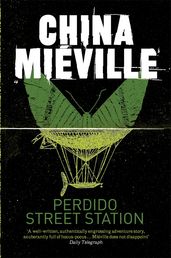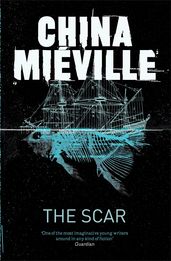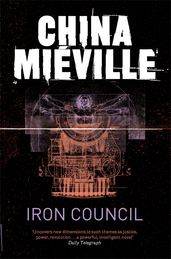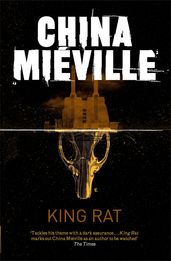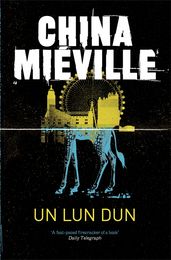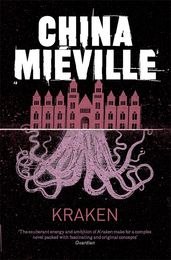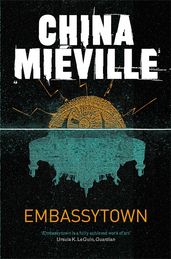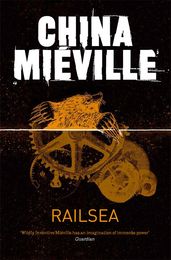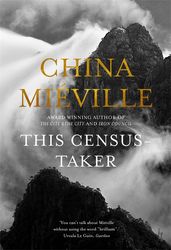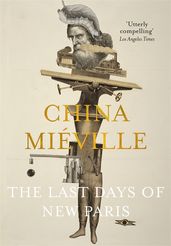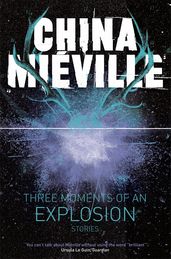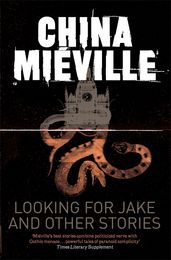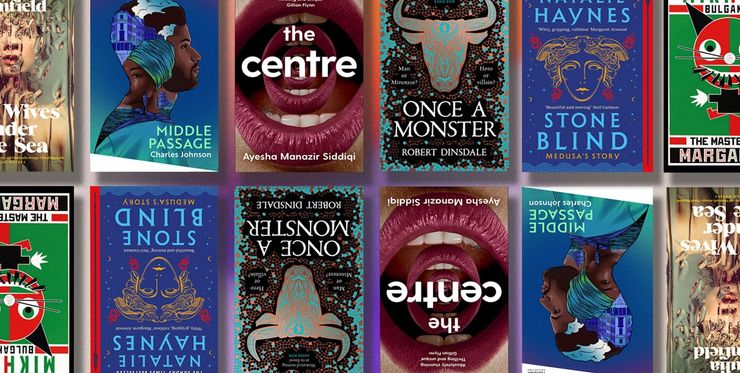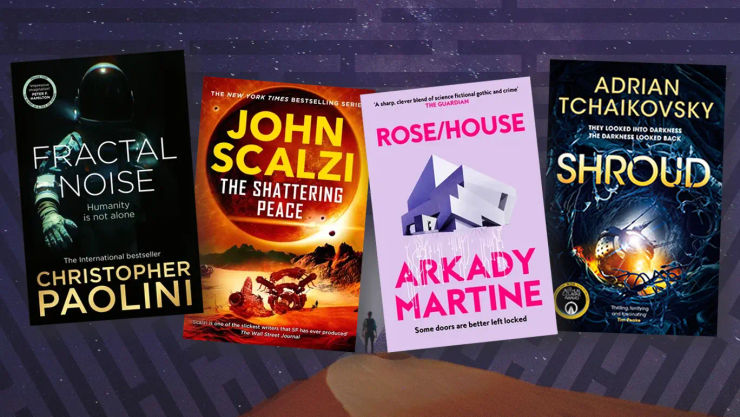China Miéville's books: a guide
There's never been a better time to discover the genius of this three-time Arthur C. Clark award-winning, genre-bending author. Read on for our guide to China Miéville's books and series.
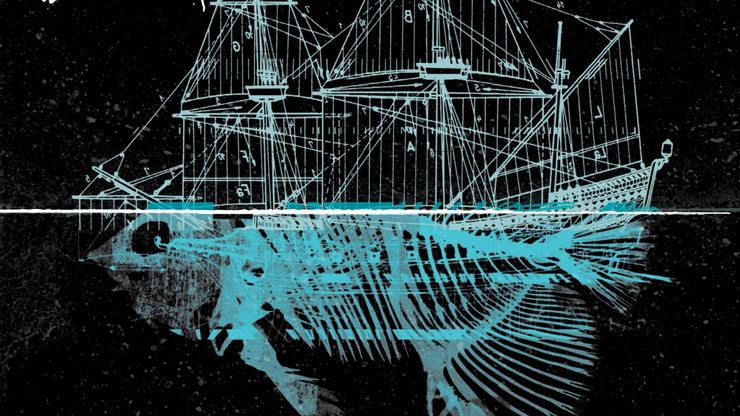
From the otherworldly thriller The City & The City to the masterpiece Bas-Lag trilogy, China Miéville's brilliant works span a range of genres. Described by the author himself as 'weird fiction', China Miéville's books all feature a fantastical cast of characters, from gun-wielding steampunk cyborgs to carnivorous giraffes and insect-like aliens, and searing commentaries about the nature of politics and modern society. Citing legendary authors including Ursula K. Le Guin, J. G. Ballard and H. P. Lovecraft as some of his literary influences, if you're a fan of bold, experimental fiction with a side of speculation and absurdity, China Miéville's books are for you.
Back in the literary spotlight thanks to The Book of Elsewhere, a novel co-written with Hollywood actor and graphic novelist Keanu Reeves, there's never been a better time to discover China Miéville's brilliant and multi-award-winning books. If you're not sure which China Miéville book to read first, read on for our guide to his best-loved novels and short stories.
China Miéville’s Bas-Lag series
Perdido Street Station
by China Miéville
A disgruntled scientist and his allies – including a de-winged hawk person, rebellious steampunk cyborgs, a bug-headed artist, and a badger – all tackle one of the great mysteries of the universe. The cast of Perdido Street Station also includes robot mobsters, the Ambassador of Hell, mantis-armed bandits, shapeless horrors, and dream-eating moths. Set in the bizarre and ceaselessly tantalising metropolis of New Crobuzon, and described in Miéville’s characteristically lush prose; thematically, Perdido Street Station is just as ambitious as the rest of Mieville’s work, with discussions of free will and agency and the rule of law and rebellion and causality and governance.
The Scar
by China Miéville
If you like reading epic fantasy: something with a proper quest, huge monsters and magic swords – try The Scar. Of course, with Miéville, nothing is taken for granted, from its delightfully non-traditional protagonist (a really grumpy translator) to the high fantasy realpolitik. In The Scar, Mieville constructs yet another amazing city in the floating rebel stronghold of Armada, home to a host of horrifying beasts, an epic naval battle, and, easily the most incredible magic sword in all of fantasy. The Scar is set in the same world as Perdido Street Station, but is a standalone, and both can be read before or after one another.
Iron Council
by China Miéville
The thrilling third novel in China Miéville’s Bas-Lag series, in Iron Council the city of New Crobuzon is being attacked from all sides. Locked in war with city-state Tesh and with tensions threatening to bubble into civil war at home, New Crobuzon is on the brink of being destroyed forever. Will the mysterious Iron Council, a band of rebels who stole a train and created their own society, return to help save the city?
China Miéville’s standalone novels
King Rat
by China Miéville
First published in 1998, King Rat is China Miéville’s eerie and otherworldly debut novel. A reimagining of the Pied Piper folktale set within the dark underground tunnels of London, King Rat stars Saul, a man searching for who is behind his father's murderer––a crime he is wrongly accused of. Weaving the lore of what lurks in London’s underground tunnels with the city’s legendary 1990s drum and bass music scene, King Rat is a love letter to Miéville's home city.
Un Lun Dun
by China Miéville
Published in 2007, Miéville’s first foray into the young adult genre was ahead of its time with its revisionist approach. When Zanna is revealed as the ‘Shwazzy’ – the ‘chosen one’ of London’s fantasy counterpart, Un Lun Dun – she and her best friend Deeba answer the call to defend that city from the evil Smog. After Zanna gives up, Deeba takes the quest on herself. Un Lun Dun features a quirky, rebellious, ‘ordinary’ girl who tackles The Big Bad with smarts and perseverance. She’s the hero despite the Prophesy, not because of it. As well as the carnivorous giraffes, Un Lun Dun also features oddly adorable sentient rubbish – including a seriously cuddly milk carton. For fans of Patrick Ness’s The Rest of Us Just Live Here, Rainbow Rowell’s Carry On, or anyone who enjoys a great story that entertains the reader while upending tropes.
The City & The City
by China Miéville
A mind-bending tale of two cities which exist alongside each other in the same time and space, this book has won numerous awards and has been likened to that cornerstone of dystopian fiction 1984. China Miéville combines crime fiction with the metaphysical in this strange and gripping tale of murder and conspiracy.
Kraken
by China Miéville
Another genre-bending London-set novel which weaves the real with the inconceivable, Kraken is the story of Billy Harrow, a marine biologist working at the city's Natural History Museum, who upon discovering that the museum's prize specimen (a giant, preserved squid) has vanished, is plunged into a world he could never have imagined. Diving into a hidden London ruled by warring cults, assassins and occultists of all forms, Billy is forced to confront his own beliefs and question what is truly real.
Embassytown
by China Miéville
Embassytown is a city perched on the limit of the known universe, a tiny outpost of humanity on the world of Arieka. The native Ariekei are, insectile aliens with two mouths and a deep, deep love of words (they call it ‘Language’). Because of this, communicating with them is tricky and humans have to employ specialised Ambassadors – twins who have been genetically tweaked to speak in unison. The result is a complex, and fragile, status quo. For a book ostensibly devoted to aliens, Embassytown is very much about what defines us as human, interrogating gender and sexuality, language and thought, identity and agency.
Railsea
by China Miéville
A steampunk young adult novel inspired, in part, by Moby Dick, Railsea takes place in a world where travellers journey across endless tracks through shifting lands inhabited by giant, dangerous moldywarpes—massive moles that tunnel beneath the surface. Sham Yes ap Soorap, a young apprentice on a train hunting the creatures, is both enthralled and disturbed by his first encounter with a hunt. Following his captain as she obsessively searches for one beast, Sham's must evade pirates and salvage-seekers and confront the possibility that Railsea might change forever.
China Miéville’s novellas
This Census-Taker
by China Miéville
A young boy’s heart skips a beat when a mysterious census taker knocks on the door of his remote house, where he lives alone with his increasingly unstable parent. As the census taker asks his questions and takes notes, the boy is forced to confront his traumatic past and face his fears. A poignant novella that explores the blurred lines between memory and reality, This Census-Taker examines the tension between personal life and government control.
The Last Days of New Paris
by China Miéville
In an alternate World War II, underground Surrealists summon sentient art to battle the Nazi occupiers. Who retaliate by summoning demons. Because of course. The Last Days of New Paris reads like a lengthy session of the greatest game you never played: full of action, spell-slinging, and, of course, monsters. Even as Miéville’s most overtly entertaining book to date, it is still laden with deeper meaning: hiding between the demons and the snipers is a heartfelt belief in the power of art – to liberate, to rebel, and to stand up against oppression. For those who dozed through their Art History classes, an intimate knowledge of art isn’t required, plus, there’s an enjoyable (in-world!) appendix at the end.
China Miéville’s short stories
Three Moments of an Explosion: Stories
by China Miéville
In these twenty-eight short stories, glistening icebergs float above urban horizons; a burning stag runs wild through the city; the ruins of industry emerge unsteadily from the sea; and the abandoned generations in a decayed space-elevator look not up at the stars but down at the Earth.
Ranging from portraits of childhood to chilling ghost stories, from dystopian visions to poignant evocations of uncanny love, Three Moments of an Explosion is a breath-taking collection that poses searching questions of what it is to be human in an unquiet world.
Looking for Jake and other stories
by China Miéville
Step into a London ravaged by unearthly creatures at once utterly alien and chillingly familiar. In addition to the award-winning novella 'The Tain', 'The Tain', this superb collection contains thirteen short stories, of visionary cityscapes and urban paranoia, ghosts, monsters and impossible diseases.
